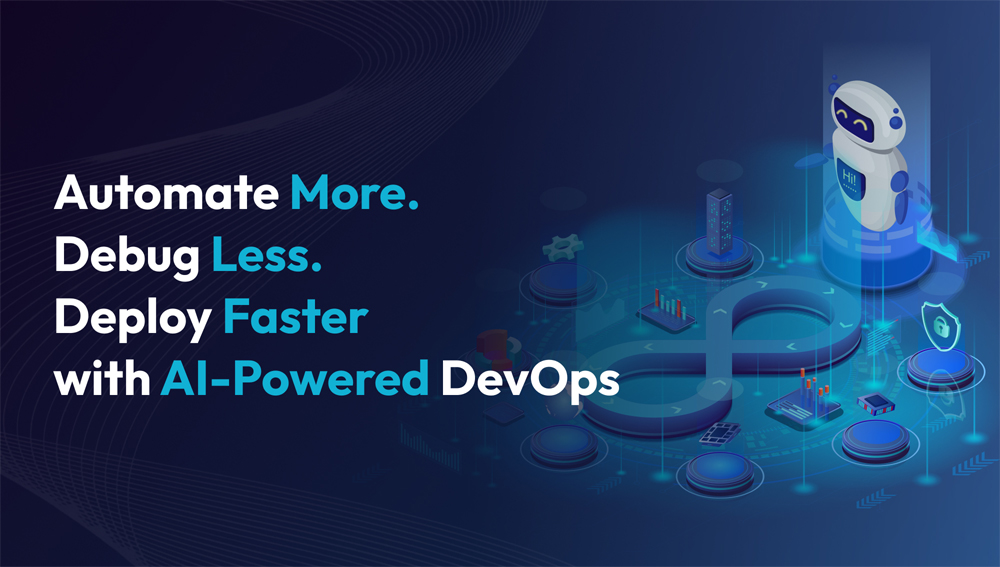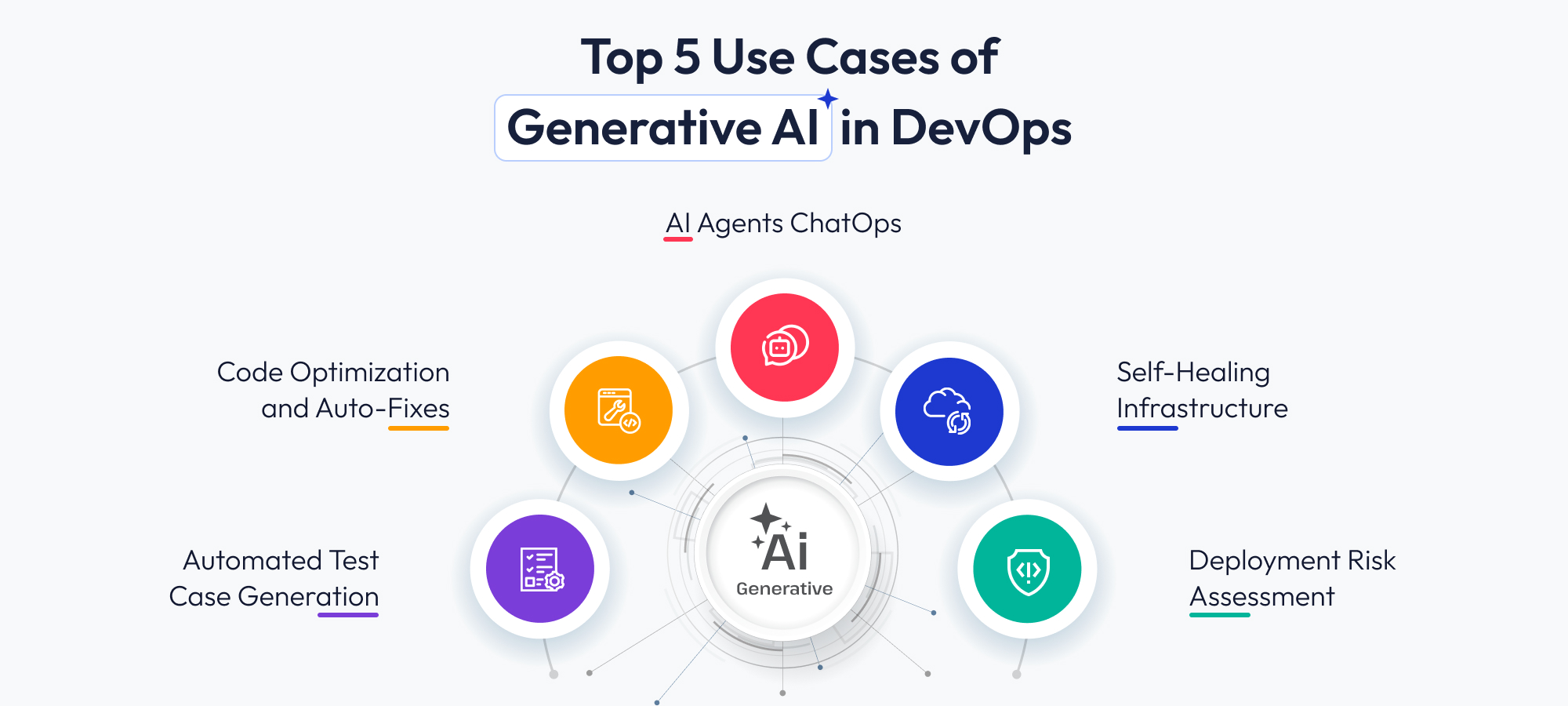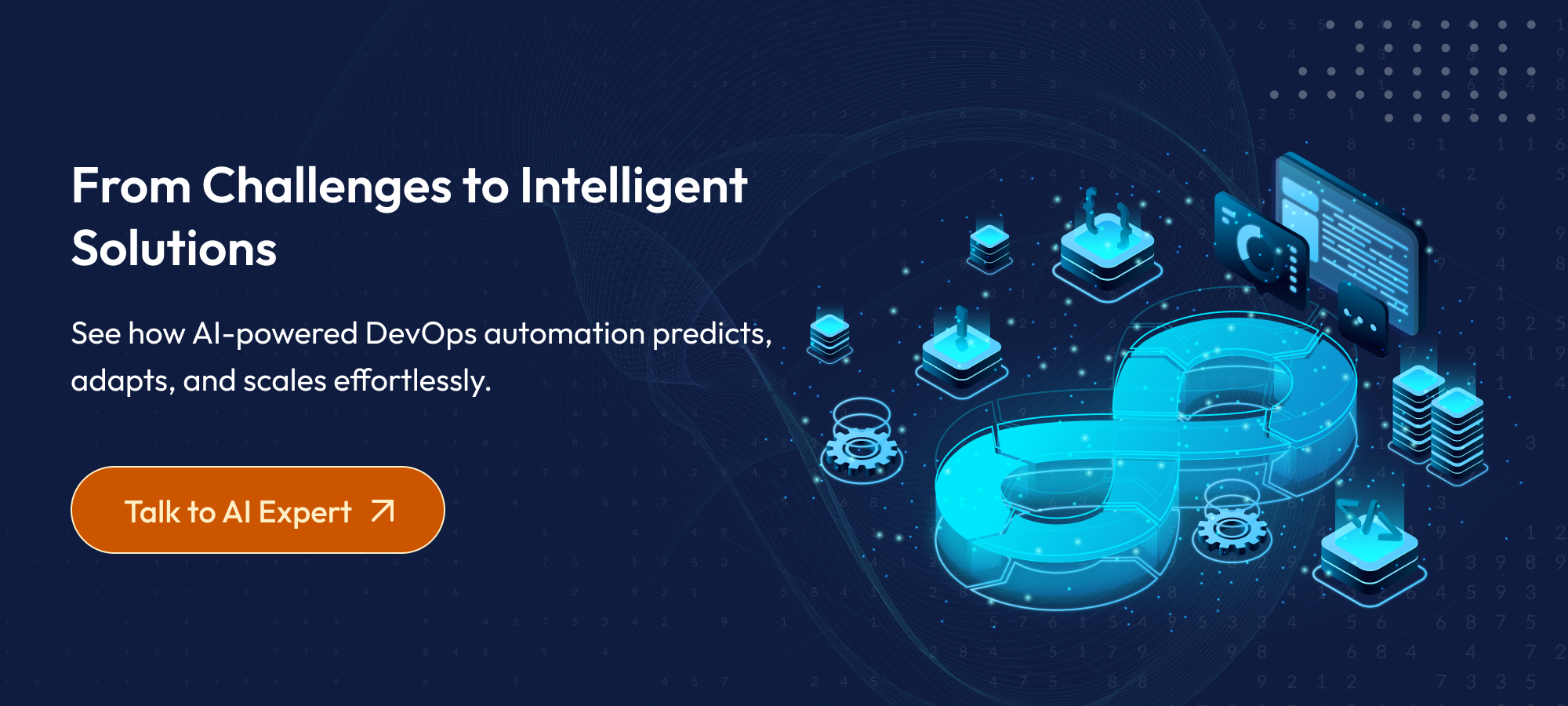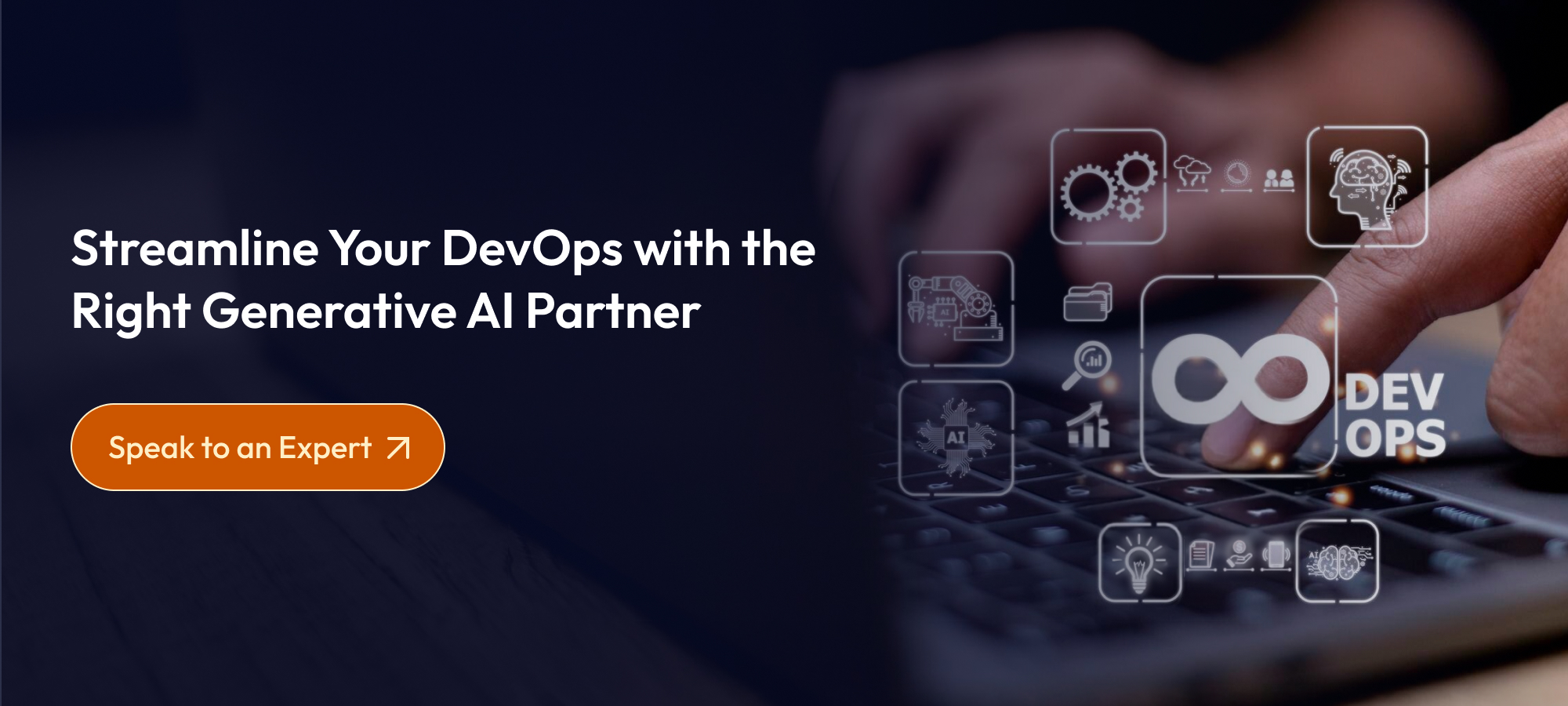
The current software delivery cycles are becoming increasingly complex. Organizations are being pressured to go to market quickly, but with higher quality and with zero downtime. The existing DevOps has already brought automation and collaboration, though even these approaches are not perfect. They need to address unpredictable infrastructure failures, rapid code debugging, and efficient scalability of CI/CD pipelines. Such bottlenecks may delay delivery and have an impact on the business performance.
This is where Generative AI in DevOps is bringing a key difference. With AI-powered intelligence as part of the DevOps processes, enterprises can achieve more than simple automation by reducing the efforts of code documentation and scripting. It is now possible to implement smarter decisions, predictive insights, and fully AI-driven DevOps automation using generative AI.
Common Challenges in Modern DevOps
Despite adopting advanced systems of DevOps automation, teams still face the same recurrent problems that delay delivery and risk the operations. The most typical issues are described as follows:
1. CI/CD Bottlenecks and Inefficacies
The backbone of DevOps is a continuous integration and delivery pipeline. But frequent failures during testing, errors in builds, and unoptimized deployments cause bottlenecks. These are increased during the scaling process without intelligent automation. Here is where automated CI/CD with Generative AI can have significant enhancements.
2. Reactive Monitoring Approach
Traditional monitoring tools warn teams once a problem has been experienced. Such a reactive model implies that downtime or loss of service quality is commonly encountered prior to a resolution being implemented. On the contrary, DevOps automation powered by AI enables predictive monitoring that predicts the risks before users are affected.
3. Manual Interventions
Most pipelines, although automated, require manual approvals, rollback, and corrections in most cases. Such interruptions limit the effectiveness of overall DevOps practices, and they slow down the release cycles. Bringing AI into DevOps can streamline the process without manual interventions.
4. Complex Debugging and Root Cause Analysis
Error burial commonly occurs in modern distributed systems, where a single mistake can get lost in multiple thousands of log files and microservice interactions. The root causes that developers search for require manual hours. This difficulty would slow down the delivery cycle without intelligent assistance and eat up engineering time.
5. Scalability and Resource Management
The increasing demands of applications impose a greater complexity on the infrastructure. Teams experience difficulties in attempting to balance performance against cost effectiveness, which results in underutilized or over-burdened systems. Combining Generative AI with the DevOps practices enables a smarter resource distribution and predictive scaling.
These challenges explain why companies should not just focus on conventional automation. They require systems that adapt, learn, and optimize regularly. This is only made possible through AI development services and the professional skills of developers who can create and implement these advanced systems.
How Generative AI Solves These Challenges
Generative AI does more than automate DevOps; it makes it smarter, more agile, and predictive. DevOps pipelines can be automated through machine learning models, natural language processing, and code generation. Here’s how:
1. Automated CI/CD with Generative AI
Regression tests, build scripts, and deployment instructions could be auto-generated through the analysis of historical data and recent code changes through Generative AI. This limits human involvement, the possibility of pipeline failure, and the speed of releases. The result is an improved, fully automated process that more efficiently completes a CI/CD pipeline and continually improves over time.
2. Intelligent Debugging and Error Resolution
As an alternative to the manual log analysis, AI models read error messages, performance indicators, and solutions recorded in the past, among other entries, for the relevant solution. There are even cases when the system can automatically create code patches. Not only does this result in a reduced mean-time-to-resolution (MTTR), it also enables developers to concentrate on innovation rather than on troubleshooting and fixing.
3. Predictive Monitoring and Incident Management
Generative AI can study real-time metrics, logs, and traffic pattern anomalies and identify them before they escalate. The predictive alerts will give sufficient time to teams to avoid possible failures before they occur, reduce unexpected outages, and customer dissatisfaction. This preventive mindset lies at the core of AI-driven DevOps automation.
4. Smarter Resource Allocation and Scalability
Analysis of workload by Generative AI advises the optimal infrastructure configuration to meet existing and future needs. This comprises auto-scaling, load balancing, and cloud cost optimization. Companies can avoid the problem of underutilization, or an excessive burden like this, by making a fair balance between performance and cost-effectiveness.
5. Continuous Learning for DevOps Practices
Generative AI is information sensitive because it learns with each implementation, problem, and solution. In the long term, it optimizes automation scripts, monitoring rules, and deployment strategies. The result is DevOps practices that not only get automated, but also become adaptive, self-improving.
Practical Use Cases of Generative AI in DevOps

Generative AI is not an emerging technology; it is already revolutionizing the way DevOps teams work. The most notable practical applications are given below:
1. Automated Test Case Generation
Testing is one of the most time-consuming processes of DevOps. Generative AI will be capable of automatically generating unit, integration, and regression test cases using historical project data and recent code commits. This minimizes manual efforts required, decreases QA cycles, and guarantees wider coverage of edge cases, which would otherwise pass unnoticed by the developers.
2. Code Optimization and Auto-Fixes
AI-based systems can inspect the source code, identifying inefficiencies, security loopholes, and performance bottlenecks. Then they recommend possible solutions or even code snippets by themselves to optimize things. This makes application development efficient, secure, and production-ready without human intervention.
3. Self-Healing Infrastructure
Infrastructure systems with AI-powered DevOps automation can detect failures as they occur and execute their corrective measures even before human action is taken. Whether it is about restarting services, reallocation of resources, or rolling back problematic updates. This limits downtime and increases the system’s resilience.
4. AI Agents ChatOps
Applied to collaboration tools, such as Slack or Microsoft Teams, generative AI agents can answer questions, execute scripts, interpret logs, and offer fixes in natural language. This enables DevOps teams to communicate with their pipelines in a natural language, helping to accelerate troubleshooting activities and automating tasks.
5. Deployment Risk Assessment
Generative AI can assess possible risks and evaluate whether failures may occur before it pushes the new code into production. This predictive model will help to release more safely, as it minimises the likelihood of letting potentially serious bugs or performance-related problems into live environments.
Why Businesses Should Act Now
The software industry is undergoing rapid change where speed, scalability, and reliability are no longer necessary, but make-or-break parameters for business. DevOps pipelines and traditional automation are effective, but they are insufficient to manage the complexity in modern applications and infrastructures. The most attractive aspect of having Generative AI in DevOps is the competitive advantage it will grant an organization by enabling operations to become more adaptive, predictive, and resilient.
Some of the benefits being realized by the early adopters of AI-driven DevOps automation include:
- Quicker release cycles with automated CI/CD pipelines are less likely to involve humans.
- Reduced downtime is possible with predictive monitoring and self-healing systems.
- Optimization of costs with resource-wise intelligent infrastructure.
- Better-quality software driven by continuous learning and smarter testing.
The increased reliance of DevOps practices on AI and the companies that wait longer to adopt would lag behind those that are currently using AI-based insights to achieve a faster and smoother pace.
It is here that the need to consult the right technology can make a difference. You can hire AI developer with experience to implement Generative AI in DevOps, to plan custom solutions, to integrate automated pipelines, and build self-healing infrastructure. Whether you want to optimize existing DevOps practices or introduce advanced AI-driven capabilities, the right support ensures that businesses not only adopt these technologies but also maximize their impact.
Concluding Thoughts
The integration of Generative AI and DevOps practices is no longer an experimental idea; it is becoming practically necessary, as organizations compete to stay competitive in a digital world. Traditional DevOps has already changed the software delivery landscape by having people work together, along with automation; however, it remains largely reactive. Generative AI goes beyond this and brings in flexibility, smartness, and a futuristic approach into daily workflows.
AI automation in DevOps services will allow businesses to be proactive, not reactive. Development teams will have the power to deliver code faster with higher frequency and fewer disruptions. This transformation leads to more reliable software, optimized infrastructure, and ultimately, stronger business outcomes.


